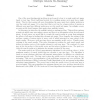1260 search results - page 110 / 252 » Bipolar Preference Problems |
LPAR
2010
Springer
14 years 8 months ago
2010
Springer
We address the problem of merging qualitative constraint networks (QCNs) representing agents local preferences or beliefs on the relative position of spatial or temporal entities. ...
ICWS
2009
IEEE
14 years 7 months ago
2009
IEEE
We present a Semantic Optimized Service Discovery (SemOSD) approach capable of handling Web service search requests on a fine-grained level of detail where we augment semantic ser...
CDC
2010
IEEE
14 years 5 months ago
2010
IEEE
We study a model of observational learning in social networks in the presence of uncertainty about agents' type distributions. Each individual receives a private noisy signal ...
JMLR
2010
14 years 4 months ago
2010
This paper presents a statistical model for expressing preferences through rankings, when the number of alternatives (items to rank) is large. A human ranker will then typically r...
STOC
2009
ACM
15 years 10 months ago
2009
ACM
One of the most fundamental problems in web search is how to re-rank result web pages based on user logs. Most traditional models for re-ranking assume each query has a single int...

